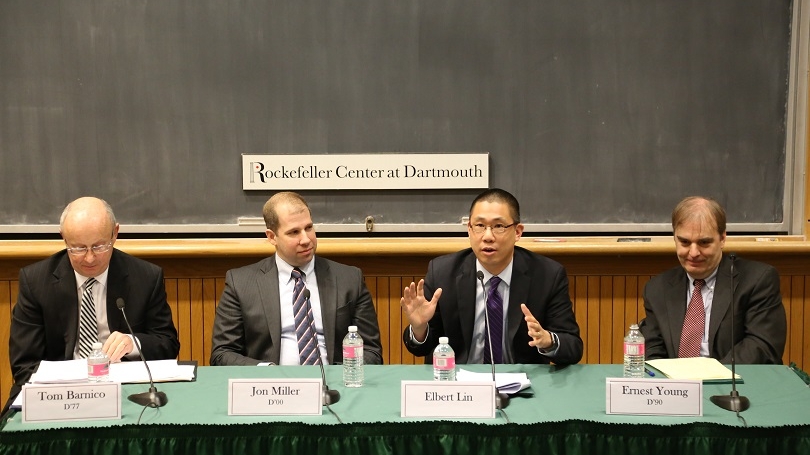
- Public Policy
- Leadership
- Funding
- News & Events
- About the Center
Back to Top Nav
Back to Top Nav
Back to Top Nav
Back to Top Nav
As the chief legal officers for their states, state attorneys general (AGs) often file lawsuits challenging the actions of Congress and the President and occupy the crucial and contested boundary between the federal and state governments. The Trump Administration presents new and rich examples for the study of the role of state AGs in litigation with the federal Executive, in cases concerning immigration, the environment, health care, and other subjects.
The Roger S. Aaron '64 Lecture this year was held as a panel discussion. Titled “State Attorneys General and President Trump: Report from the Courts," Elbert Lin, former WV Solicitor General; Jon Miller ’00, MA Attorney Gen. Office; and Ernie Young ’90, Duke Law School participated at panelist. The moderator was Tom Barnico ’77, Boston College Law School. The event was co-sponsored with the Dartmouth Lawyers Association and the Dartmouth Legal Studies Faculty Group
Prior to the event, Mariah Reese ’17, who graduated this spring with a B.E. interviewed Jonathan Miller, Chief of the Public Protection & Advocacy Bureau with the Massachusetts Office of the Attorney General, and Elbert Lin, a partner at Hunton & Williams LLP., Richmond, VA, and former Solicitor General of West Virginia.
Miller started his career as a journalist, investigating the pressing issues and detailing them to inform the public. However, after moving to Texas his interest in law was piqued after observing how his community worked around a Supreme Court ruling. He then began learning about the power of constitutional law and litigation.
Lin wanted to take the road less traveled and do something different than his parents and their friends. He studied engineering in college, and when he entered law school, he saw constructing legal cases like solving math problems – as he could use his analytical skillset.
Now fully established in their field, Mariah asked them for their views on mentorship – one of the best professional and personal tools for growth. Miller believes it is very important especially when you are overwhelmed and need another perspective when thinking about career choices. Those relationships are invaluable and eliminate the burden of doing it alone. He is currently a mentor for the younger attorneys at his job, providing support and a listening ear. Lin is still both a mentee and a mentor. At every place of employment, Lin has sought out mentors. He explains that you cannot sit back and think someone is going to find you. In order to find a mentor, he suggests keeping your eyes open, see if the person has the same temperament, values and judgment, and do not be afraid to knock on their door and ask them questions. Miller also notes that it is a trial-and-error process to find a suitable mentor.
In order to maintain these relationships, Lin compares it to a garden – something that you have to continuously maintain and nurture. If you are in town, visit them, share your successes and failures, and send them holiday cards. Lin adds that they are invested in you, so show that you value the relationship and put in the effort.
Written by Mariah Reese ’17, Rockefeller Center Student Program Assistant for Public Programs
The views and opinions expressed and any materials presented during a public program are the speaker’s own and do not necessarily represent the views and opinions of the Rockefeller Center or constitute an endorsement by the Center.